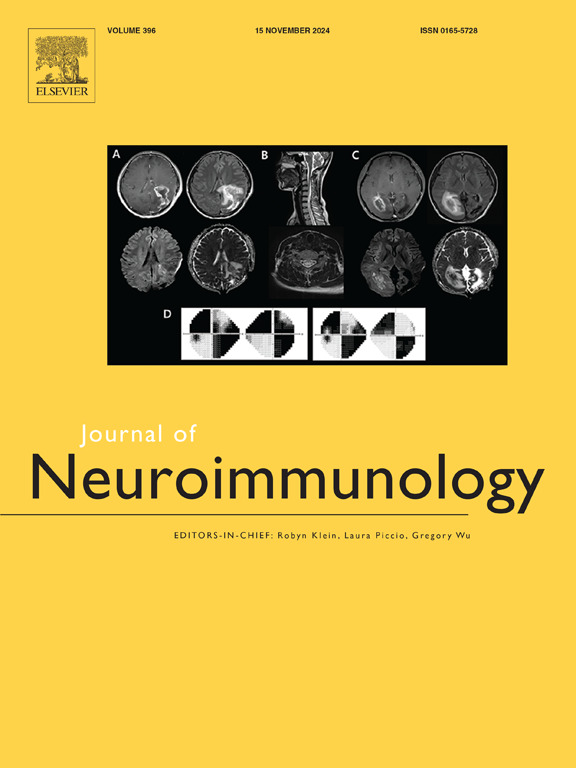髓鞘少突胶质细胞糖蛋白抗体相关性脑脊髓炎患儿隐匿性软骨脉络膜瘤
IF 2.5
4区 医学
Q3 IMMUNOLOGY
引用次数: 0
摘要
髓鞘少突胶质细胞糖蛋白抗体相关疾病是一种中枢炎性脱髓鞘疾病,可引起多种神经系统症状。副肿瘤神经系统综合征与恶性肿瘤相关,并表现为广泛的神经精神症状。副肿瘤神经综合征在髓鞘少突胶质细胞糖蛋白抗体相关疾病中很少见,通常见于成人。在此,我们报告一个3岁的女孩,她表现为下肢瘫痪,尿潴留,髓鞘少突胶质细胞糖蛋白抗体血清阳性。她的症状对各种免疫疗法都没有反应。她偶然发现颈部有软骨绒毛瘤,手术切除后症状恢复,无复发。切除肿瘤的免疫组化分析显示软骨组织内髓鞘少突胶质细胞糖蛋白的表达。根据本病例经验,表现为髓鞘少突胶质细胞糖蛋白抗体相关疾病的儿童如果对免疫治疗没有反应,可能需要及时筛查隐匿性肿瘤。本文章由计算机程序翻译,如有差异,请以英文原文为准。
Occult cartilaginous choristoma in a child with myelin oligodendrocyte glycoprotein antibody-associated encephalomyelitis
Myelin oligodendrocyte glycoprotein antibody-associated disease is a central inflammatory demyelinating disorder that cause diverse neurological symptoms. Paraneoplastic neurologic syndromes occur in association with malignant neoplasms and manifest with a wide range of neuropsychiatric symptoms. Paraneoplastic neurological syndrome is rare in myelin oligodendrocyte glycoprotein antibody-associated disease and, when reported, is typically seen in adults. Herein, we report a 3-year-old girl who presented with lower limb paralysis, urinary retention, and seropositivity for myelin oligodendrocyte glycoprotein antibody. Her symptoms did not respond to various immunotherapies. She was incidentally found to have a cartilaginous choristoma in the neck, after surgical resection of which, she showed symptomatic recovery without recurrence. Immunohistochemical analysis of the resected tumor revealed expression of myelin oligodendrocyte glycoprotein within the cartilage tissue. Based on this case experience, children presenting with myelin oligodendrocyte glycoprotein antibody-associated disease who fail to respond to immunotherapies may need prompt screening for occult tumors.
求助全文
通过发布文献求助,成功后即可免费获取论文全文。
去求助
来源期刊

Journal of neuroimmunology
医学-免疫学
CiteScore
6.10
自引率
3.00%
发文量
154
审稿时长
37 days
期刊介绍:
The Journal of Neuroimmunology affords a forum for the publication of works applying immunologic methodology to the furtherance of the neurological sciences. Studies on all branches of the neurosciences, particularly fundamental and applied neurobiology, neurology, neuropathology, neurochemistry, neurovirology, neuroendocrinology, neuromuscular research, neuropharmacology and psychology, which involve either immunologic methodology (e.g. immunocytochemistry) or fundamental immunology (e.g. antibody and lymphocyte assays), are considered for publication.
 求助内容:
求助内容: 应助结果提醒方式:
应助结果提醒方式:


